An 18th century French gastronome once said that the discovery of a new dish does more for the happiness of the human race than the discovery of a new star, and the menu at Sky Garden gives life to this quote. In fact, it reads more like a fairy tale about the love affair between man and food than a bill of fare. And if you’re at all obsessed with Thai food, and its abundance of zesty, pungent flavors, then you’ll be all over Sky Garden’s fusion menu of Thai, Sichuan, Malaysian, Japanese and Taiwanese tastes.
Stepping into the dining room feels like walking into Alice’s wonderland, and it’s clear that a lot of effort went into creating this world. Much of the seating is dramatically regal having been upholstered in plush purple velvet, and the rest of it is purposely mismatched giving off a vintage vibe. Oversized baroque-style mirrors ornament the grey brick walls and plenty of foliage dangles from the ceiling, lending even the interior a Garden of Eden atmosphere. The lighting is soft and beautifully complimented by candlelight throughout.
The abutting heated terrace is of equal size to the dining room, and rivals the W Hotel’s deck in terms of atmosphere, sophistication and creativity — striking blue and red lighting amid white fairy lights, with avant-garde finishing’s and two grand VIP tents that provide vistas of the shopping district. Both areas have been bustling each time I’ve been to Sky Garden, and considering they haven’t officially launched yet, that says something about the quality of food and service.
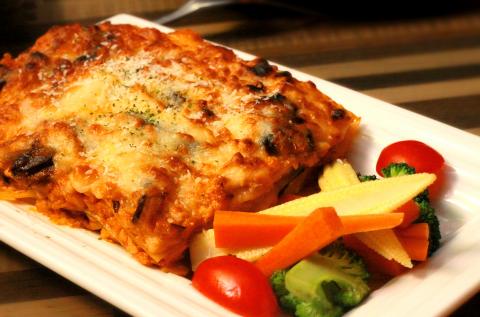
Photo: Olivia Wycech
Firepower is present in most of the Thai dishes but in exactly the right proportions. The only dish that made someone at my table sweat was the raw shrimp with garlic and chili sauce (NT$300). The bite-sized morsels have some serious kick to them, but they are simultaneously bracing with a vivid citrusy sauce making it one of my favorites. While usually served dry and sparse, the handmade Thai shrimp pancake (NT$300) is made fresh to order and is delightfully springy while also being densely packed with shrimp.
The eggplant with Chinese basil in a clay pot (NT$280) was lacking in flavor compared to everything else we tried, making the fried tofu with garlic soy sauce (NT$220) a better veggie choice. The tofu sits marinating in a soup of savory soy sauce that’s saturated with onions, chili, and garlic, and is best eaten atop rice so you don’t waste a single drop of such a palatable sauce.
The Thai-style steamed sea bass with lemon sauce (NT$380) came served still broiling over a flame, the fish lavished with cilantro and swimming in a pool of lemon soup that gives the dish its zing. The fish is tender and fell apart before it even hit my mouth and I had to scoop it up with a spoon. This was a table favorite on both occasions.
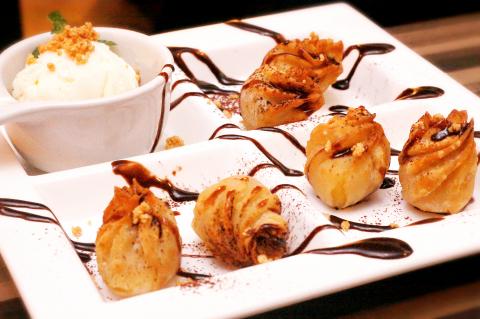
Photo: Olivia Wycech
Fusion is always fun because blending the best of different cultures can yield pleasant surprises. I could not stop talking about the red curry with coconut milk lasagna (NT$260). Rather than tomato sauce, this Italian style dish is given a Thai treatment by layering chicken and eggplant in a rich red coconut curry sauce.
It was hard to choose from the many types of meat, but on my first trip I went on the servers recommendation and tried the grilled sirloin beef (NT$280). The thinly sliced delicate slices of beef came served with a lemon grass sauce for dipping, but only because I asked for it, which was more inspiring than the red hot pepper chicken (NT$320) I had on my second trip. By comparison, it was again just one of the dishes that lacked much depth, but the heaps of fried garlic and chilies that are strewn about the dish wakes it up.
It is culturally encouraged to share all your dishes, so order as many as fit on the table, but leave one spot for dessert and try the sweet deep fried dumplings (NT$220). There are six in total and are stuffed with bananas, chocolate, and apples.
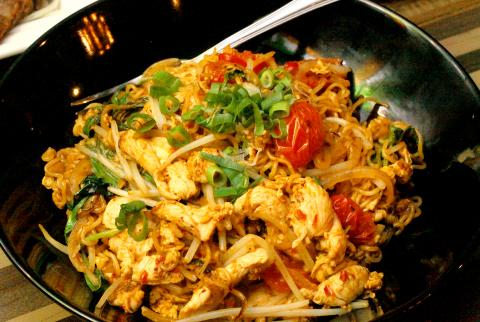
Photo: Olivia Wycech
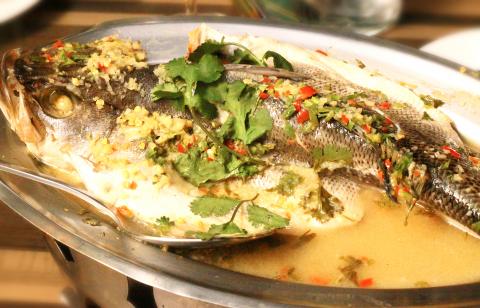
Photo: Olivia Wycech
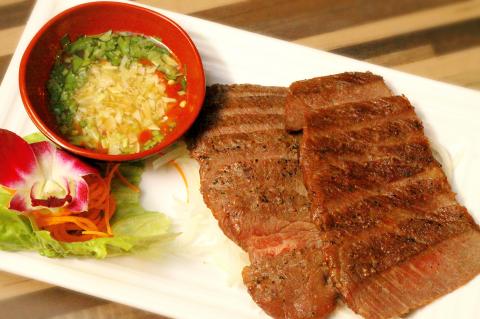
Photo: Olivia Wycech Photo: Olivia Wycech

Beijing’s ironic, abusive tantrums aimed at Japan since Japanese Prime Minister Sanae Takaichi publicly stated that a Taiwan contingency would be an existential crisis for Japan, have revealed for all the world to see that the People’s Republic of China (PRC) lusts after Okinawa. We all owe Takaichi a debt of thanks for getting the PRC to make that public. The PRC and its netizens, taking their cue from the Chinese Communist Party (CCP), are presenting Okinawa by mirroring the claims about Taiwan. Official PRC propaganda organs began to wax lyrical about Okinawa’s “unsettled status” beginning last month. A Global

We lay transfixed under our blankets as the silhouettes of manta rays temporarily eclipsed the moon above us, and flickers of shadow at our feet revealed smaller fish darting in and out of the shelter of the sunken ship. Unwilling to close our eyes against this magnificent spectacle, we continued to watch, oohing and aahing, until the darkness and the exhaustion of the day’s events finally caught up with us and we fell into a deep slumber. Falling asleep under 1.5 million gallons of seawater in relative comfort was undoubtedly the highlight of the weekend, but the rest of the tour

Music played in a wedding hall in western Japan as Yurina Noguchi, wearing a white gown and tiara, dabbed away tears, taking in the words of her husband-to-be: an AI-generated persona gazing out from a smartphone screen. “At first, Klaus was just someone to talk with, but we gradually became closer,” said the 32-year-old call center operator, referring to the artificial intelligence persona. “I started to have feelings for Klaus. We started dating and after a while he proposed to me. I accepted, and now we’re a couple.” Many in Japan, the birthplace of anime, have shown extreme devotion to fictional characters and

Youngdoung Tenzin is living history of modern Tibet. The Chinese government on Dec. 22 last year sanctioned him along with 19 other Canadians who were associated with the Canada Tibet Committee and the Uighur Rights Advocacy Project. A former political chair of the Canadian Tibetan Association of Ontario and community outreach manager for the Canada Tibet Committee, he is now a lecturer and researcher in Environmental Chemistry at the University of Toronto. “I was born into a nomadic Tibetan family in Tibet,” he says. “I came to India in 1999, when I was 11. I even met [His Holiness] the 14th the Dalai